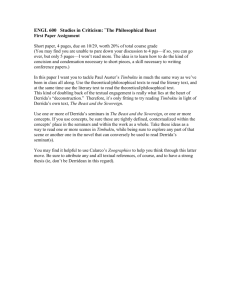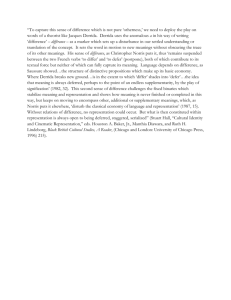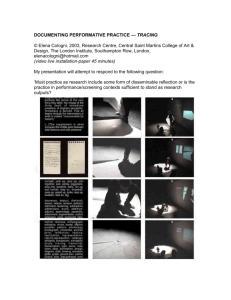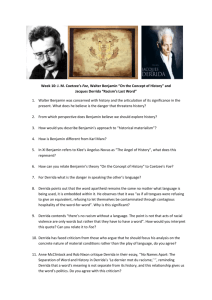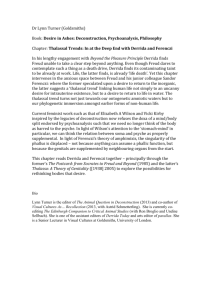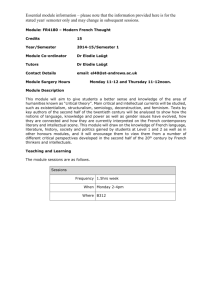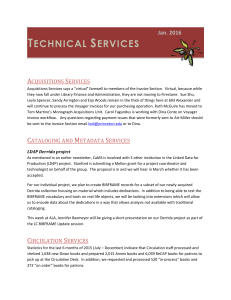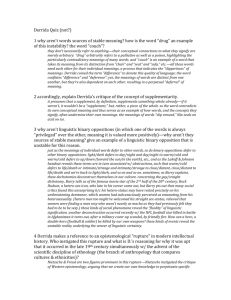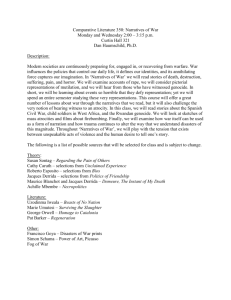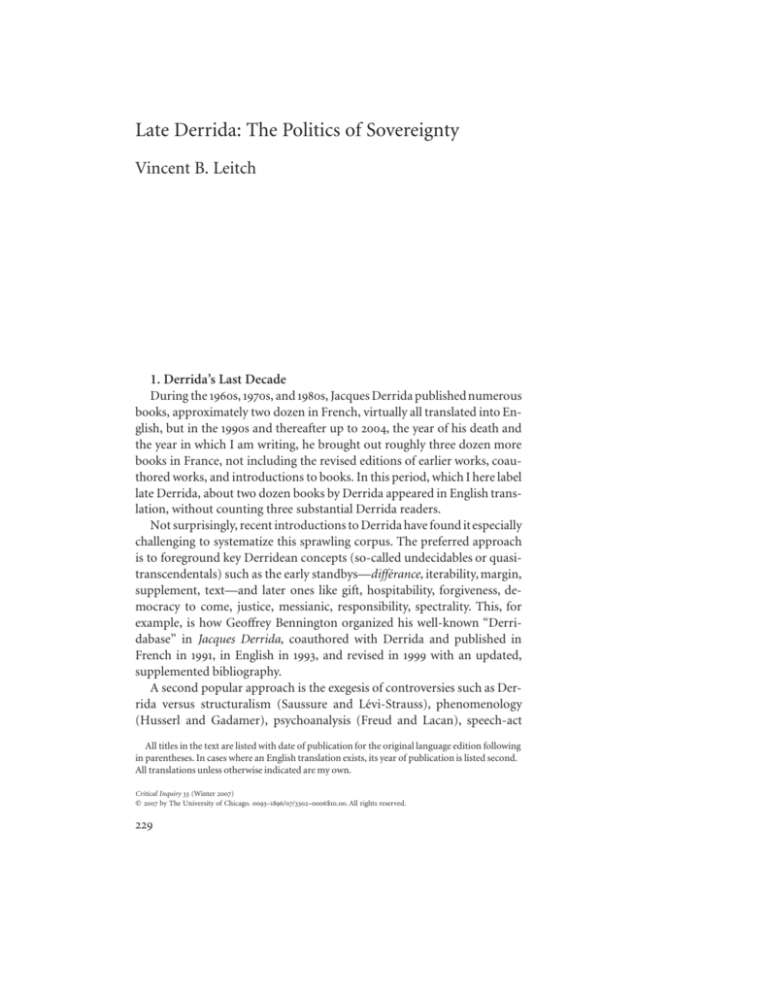
Late Derrida: The Politics of Sovereignty
Vincent B. Leitch
1. Derrida’s Last Decade
During the 1960s, 1970s, and 1980s, Jacques Derrida published numerous
books, approximately two dozen in French, virtually all translated into English, but in the 1990s and thereafter up to 2004, the year of his death and
the year in which I am writing, he brought out roughly three dozen more
books in France, not including the revised editions of earlier works, coauthored works, and introductions to books. In this period, which I here label
late Derrida, about two dozen books by Derrida appeared in English translation, without counting three substantial Derrida readers.
Not surprisingly, recent introductions to Derrida have found it especially
challenging to systematize this sprawling corpus. The preferred approach
is to foreground key Derridean concepts (so-called undecidables or quasitranscendentals) such as the early standbys—différance, iterability, margin,
supplement, text—and later ones like gift, hospitability, forgiveness, democracy to come, justice, messianic, responsibility, spectrality. This, for
example, is how Geoffrey Bennington organized his well-known “Derridabase” in Jacques Derrida, coauthored with Derrida and published in
French in 1991, in English in 1993, and revised in 1999 with an updated,
supplemented bibliography.
A second popular approach is the exegesis of controversies such as Derrida versus structuralism (Saussure and Lévi-Strauss), phenomenology
(Husserl and Gadamer), psychoanalysis (Freud and Lacan), speech-act
All titles in the text are listed with date of publication for the original language edition following
in parentheses. In cases where an English translation exists, its year of publication is listed second.
All translations unless otherwise indicated are my own.
Critical Inquiry 33 (Winter 2007)
䉷 2007 by The University of Chicago. 0093–1896/07/3302–0006$10.00. All rights reserved.
229
230
Vincent B. Leitch / Politics of Sovereignty
theory (Austin and Searle), communications theory (Habermas), and orthodox Marxism. There are also his conflictual one-on-one encounters, numerous and sometimes recurring, with major figures like Plato, Rousseau,
Kant, Hegel, Nietzsche, Heidegger, Blanchot, Lévinas, Foucault, and de
Man, among others. Marc Goldschmit employs this method in his Jacques
Derrida: Une Introduction (2003), as does the substantial concluding chapter of Understanding Derrida (2004), edited by Jack Reynolds and Jonathan Roffe, an introductory book containing eleven chapters by different
hands on standard topics such as language, literature, art, ethics, religion,
and politics.
A third way of managing while introducing Derrida’s immense body of
work mixes and matches key concepts, controversies, and critical encounters, also offering the usual detailed subdivided bibliographies of his works
as well as works on him.1 This, for example, is how Nicholas Royle’s Jacques
Derrida (2003) proceeds. Yet, given the scope and complexity of his corpus,
Derrida’s scholarly readers, no matter their approach, risk becoming disciples rather than critics, expending copious energy systematizing, deciphering, standing by attentively, ventriloquizing.
The many books by and about Derrida, especially during the 1990s, set
the context for a visit I made to Paris in 2004, a few months before Derrida’s
passing in early autumn. At that time I encountered several not yet translated texts by Derrida, namely, De quoi demain . . . Dialogue [For What
Tomorrow . . . A Dialogue] (2001), a wide-ranging and lively dialogue with
Elisabeth Roudinesco covering nine topics in nine chapters, ranging from
the death penalty and anti-Semitism to the changing family and animal
rights and to more expected topics like psychoanalysis, contemporary philosophy, Marxism, and theories of identity and liberty; Voyous [Rogues]
(2003), two lengthy addresses focusing on contemporary politics, taking up
the issues of rogue states, international law, democracy, reason, and especially sovereignty; and Genèses, genealogies, genres, et le génie [Geneses, Genealogies, Genres, and Genius] (2003), an appreciation of the literary work
1. For the best bibliographical source, see Peter Krapp, “Bibliography of Publications by
Jacques Derrida,” www.hydra.umn.edu/derrida/jdind.html
Vi n c e n t B . L e i t c h is Paul and Carol Daube Sutton Chair in English at the
University of Oklahoma, where he teaches criticism and theory. He is author of
Cultural Criticism, Literary Theory, Poststructuralism (1992), Postmodernism—
Local Effects, Global Flows (1996), and Theory Matters (2003), and served as the
general editor of the Norton Anthology of Theory and Criticism (2001). The
present article is part of a book nearing completion entitled A Defense of Theory.
Critical Inquiry / Winter 2007
of Hélène Cixous that briefly sketches an account of genius. The political
concerns of the first two books also appear, though in a more concise form,
in the contemporaneous English-language casebook Philosophy in a Time
of Terror: Dialogues with Jürgen Habermas and Jacques Derrida (2003), which
contains a revealing interview with Derrida (as well as Habermas) by Giovanna Borradori. The texts published in the opening years of the new century followed an immensely productive prior decade that included a spate
of books gathering Derrida’s many interviews, specifically Points . . . Interviews, 1974–1994 (1992/1995), Sur parole: Instantanés philosophiques [On my
Word: Philosophical Snapshots] (1999), and Negotiations: Interventions and
Interviews, 1971–2001 (2002); his dialogues with Maurizio Ferraris, A Taste
for the Secret (1997/2001), and Catherine Malabou, La Contre-alleé, [Counterpath] (1999); his many pieces on education and pedagogy in Who’s Afraid
of Philosophy? (1990/2002) and Eyes of the University (1990/2004); and the
provocative The University without Condition (2001), a short book in French
available in Derrida’s English-language collection of addresses Without Alibi
(2002). In the realms of politics and ethics there were such late texts as The
Other Heading (1991/1992), Specters of Marx (1993/1994), Politics of Friendship (1994/1997), Of Hospitality (1997/2000), On Cosmopolitanism and Forgiveness (2001) (two late 1990s addresses joined in this English-only book),
and Marx & Sons (2002), a small book in French published earlier in English
as a lengthy final essay addressed to his leftist critics in Ghostly Demarcations:
A Symposium on Jacques Derrida’s “Specters of Marx” (1999).
At a key point in the conversation with Ferraris, Derrida looked back
over his career and revealed, “Each time I write a text, it is ‘on occasion,’
occasional, for some occasion. I have never planned to write a text; everything I’ve done, even the most composite of my books, were ‘occasioned’
by a question. My concern with the date and the signature confirms it.”2
Indeed, many of Derrida’s texts give the appearance of being thrown together like preliminary thinking exercises, lacking editing, especially for
economy and careful organization, performances that amble sometimes
loosely, sometimes stunningly. About writing systematic treatises in Kantian fashion, Derrida declared, “It is no longer possible to write a great philosophical ‘machine.’ . . . I always operate through small oblique essays”
2. Jacques Derrida and Maurizio Ferraris, A Taste for the Secret, trans. Giacomo Donis, ed.
Donis and David Webb (Cambridge, 2001), p. 62; hereafter abbreviated ATS. This book contains
five dialogues between Ferraris and Derrida from July 1993 to November 1994, plus one between
Gianni Vattimo and Derrida in January 1995. “Starting in the 1990s, Derrida’s tendency to write in
outline became even more pronounced as he delivered bits and pieces of [for example] a thesis on
hospitality that one had to glean from a number of different texts” (Herman Rapaport, Later
Derrida: Reading the Recent Work [New York, 2003], p. 26). Rapaport’s book focuses on a range of
topics, though not politics.
231
232
Vincent B. Leitch / Politics of Sovereignty
(ATS, p. 81). Concerning this generic obliqueness, Bennington notes kindly
that “deconstruction happens more in the journey than the arrival,”3 and
Royle observes that “all of Derrida’s work is concerned with the appearance
or apparitional effects of digression.”4 And yet concepts do regularly recur
from one text to another and on occasion cluster in nodal points and condensations, bringing into view Derrida’s infrastructure, his pharmacy, an
ensemble of quasi-transcendental concepts, as in the case of sovereignty, a
topic neither examined nor assessed with care elsewhere in the scholarly
literature on late Derrida.
2. Sovereignty Deconstructed
In Voyous, for example, Derrida explores several main topics, particularly
rogue states, reason, and sovereignty in relation to democracy. Titled “The
Reason of the Strongest (Are There Rogue States?),” the first lengthy address, Derrida notes scrupulously, was delivered on the occasion of a conference on “The Democracy to Come” in July 2002 at Cerisy-la-Salle, while
the second, shorter lecture, “The ‘World’ of the Enlightenment to Come
(Exception, Calculation, and Sovereignty),” took place at the University of
Nice during August 2002 at the twenty-ninth Congress of the Association
of French Language Societies of Philosophy. This much is clear about the
book’s title and topic from the preface: the rogue state “does not respect its
state duties before the law of the world community and the obligations of
international law; the state scoffs at the law—and mocks the condition of
law.”5 A footnote to this definition immediately questions: “Does the reason
of state always submit to the condition of law? Does sovereignty itself relieve
it of the condition of law? Or else does it exceed and betray it, always as an
exception, at the very moment it claims precisely to establish it?” (V, p. 12n).
Derrida puts the concept of sovereignty in question at the outset, and the
rogue state has everything to do with it. What happens in contemporary
politics plays a leading role here, as Derrida illustrates in this and a dozen
other late texts.6
3. Geoffrey Bennington and Derrida, Jacques Derrida, trans. Bennington (Chicago, 1999), p.
169.
4. Nicholas Royle, Jacques Derrida (London, 2003), p. 96. In a recent documentary, Derrida is
quoted from an unpublished 1982 interview that sets improvisation against stereotypical
discourses as saying “I believe in improvisation” (Derrida, DVD, dir. Kirby Dick and Amy Ziering
Kofman [Zeitgeist Video, 2003]).
5. Derrida, Voyous (Paris, 2003), p. 12; hereafter abbreviated V.
6. Bennington notes, “There is no easy way to distinguish logical concerns from
epistemological ones in Derrida, nor these from ethical or political ones” (Bennington, “Derrida
and Politics,” in Jacques Derrida and the Humanities: A Critical Reader, ed. Tom Cohen
[Cambridge, 2001], p. 197). Meanwhile, Richard Beardsworth observes that “the domain of
politics is not a privileged object of reflection for Derrida, although recent work of the 1990s has
mobilized and reworked the term more immediately than that of the past” (Beardsworth, Derrida
Critical Inquiry / Winter 2007
Citing Noam Chomsky’s Rogue States: The Rule of Force in World Affairs
(2000), Robert Litwak’s Rogue States and U.S. Foreign Policy (2000), and
William Blum’s The Rogue State (2001), Derrida confirms “the most perverse, violent, and destructive of rogue states would thus be, first, the United
States and occasionally its allies” (V, p. 139). Insofar as this nuclear state
stands arrogantly above and disregards international laws and treaties, often
in the name of a supremacist nation-state sovereignty, this hegemon simultaneously relies on and yet undermines the concept of sovereignty. Can
there be several hundred fully sovereign nations in the world? Are limitations necessary? How do things stand with the politics of sovereignty?
Usually defined as supreme authority within a territory, linked with a
historical sequence of sovereigns (God, king, people, nation, will), sovereignty among nation-states dates from the time of the Peace of Westphalia
(1648), when interference in other states’ governing prerogatives became
unacceptable. Following Carl Schmitt, Derrida points out that “a sovereign
is defined by his capacity to decide the exception [and he has] the right to
suspend the law.”7 During modern democratic times this ontotheological
right passes to the governing body or leader. In the U.S., for instance, it
manifests itself in the right of the president to grant amnesty from judicial
judgments. Moreover, a state’s “monopoly on violence is of a piece with the
motif of sovereignty. It is also what will always have grounded the death
penalty, the right of the state, the right of the sovereign to punish by death.”8
and the Political [London, 1996], p. xi). Finally, in his otherwise excellent book Simon Critchley
unconvincingly declares, “In my experience of reading Derrida, the closer one looks, the harder it
is to find any substantial difference between earlier and later work” (Critchley, Ethics, Politics,
Subjectivity: Essays on Derrida, Lévinas, and Contemporary French Thought [London, 1999], p. 96).
On the contrary, the later work appears both more haphazard and more preoccupied with politics
and ethics. In his Derrida, Responsibility, and Politics (Brookfield, Vt., 1997), Morag Patrick
defends Derrida against charges of ethicopolitical nihilism, and in the process he reviews many
political criticisms launched against Derrida during his career. However, nothing is said about
sovereignty, a key concern of Derrida’s late work.
Preliminary observations on the politics of sovereignty appear in Seyla Benhabib, “Democracy
and Difference: Reflections on the Metapolitics of Lyotard and Derrida,” in Jacques Derrida, ed.
Christopher Norris and David Roden, 4 vols. (London, 2003), esp. 4:221–28. This four-volume
work reprints sixty-five articles and book chapters of critical reaction to Derrida dating from the
1970s to the new century. Despite its 1,600 pages and 22 topics, the critical legacy is highly selective,
privileging philosophers and philosophy.
7. Derrida and Elisabeth Roudinesco, De quoi demain . . . Dialogue (Paris, 2001), p. 151;
hereafter abbreviated DQD.
8. Derrida, Without Alibi, trans. and ed. Peggy Kamuf (Stanford, Calif., 2002), p. 268; hereafter
abbreviated WA. This book contains five late addresses and essays plus a foreword by Derrida.
Kamuf states that “perhaps the book’s essential trait common to all its chapters [is] the trait of
sovereignty” (WA, p. xiii). For a useful discussion of Derrida’s thinking on violence, see David C.
Durst, “The Place of the Political in Derrida and Foucault,” Political Theory 28 (Oct. 2000): 675–
89, which is a review of Beardsworth, Derrida and the Political and Jon Simons, Foucault and the
Political (London, 1995).
233
234
Vincent B. Leitch / Politics of Sovereignty
In addition to the death penalty, sovereignty enables a state to control its
borders and exclude noncitizens as well as to protect itself from outside
threats (today that includes forces of globalization and terrorism). In its
practice, sovereignty remains connected with the use of force and the principle that might is right.
There are paradoxical nondemocratic features of sovereignty, as Derrida’s various deconstructions strikingly demonstrate. Consider the contradictory idea of a sovereign (one over many), the concept of exception
(being above the law), the notion of the death penalty (contravening the
right to life of the citizen), and the fact that “only small states ever see their
sovereignty contested and disputed by powerful states. . . . Powerful states
never allow their own sovereignty to be challenged.”9 Additionally, the U.S.
in special nondemocratic, contradictory ways not only “plays a virtually
sovereign role among sovereign states”10 but dominates the elite inner circle
of the United Nations (the nondemocratic Security Council), exercising
there a sovereign unilateralism:
As always, these two principles, democracy and sovereignty, are at once
and by turns indissociable and in contradiction with each other. For democracy to be real, in order to grant space to a right to assert its idea,
and to become actual, it requires the cratie [power] of the demos [people]—in this case of the global demos. Thus, it requires a sovereignty,
namely a force stronger than all others in the world. But if the constitution of this force is indeed destined in principle to represent and protect
this global democracy, it in fact betrays and threatens it at the outset.
[V, p. 143]
Despite the terrible aporias of sovereignty in its modern democratic
forms, Derrida aimed to preserve it, but in limited and shared forms. Such
9. Derrida, Negotiations: Interventions and Interviews, 1971–2001, trans. and ed. Elizabeth
Rottenberg (Stanford, Calif., 2002), p. 385; hereafter abbreviated N. This extensive collection,
notes the back cover, “encompasses the political and ethical thinking of Jacques Derrida over
thirty years.”
Among the most paradoxical features of sovereignty are the dynamics of time and language.
The essential “indivisibility” of sovereignty is undermined by temporality and history as well as by
discourse’s soliciting of the other and its dividing of authority (V, p. 144). Derrida does not follow
up on these provocative disruptions.
Here is another vexing trait of sovereignty: “The sovereign has the right not to respond; he has a
right to the silence of this asymmetry. He has a right to a certain irresponsibility” (Derrida, “La
Bête et le souverain,” La Démocratie à venir: Autour de Jacques Derrida, ed. Marie-Louise Mallet
[Paris, 2004], p. 472). This essay consists of extracts from two sessions of Derrida’s seminar “The
Beast and the Sovereign” in Paris in 2001–2.
10. Giovanna Borradori, Philosophy in a Time of Terror: Dialogues with Jürgen Habermas and
Jacques Derrida (Chicago, 2003), p. 94; hereafter abbreviated PTT.
Critical Inquiry / Winter 2007
deconstructive questioning and sharing is, he realized, what is in any case
happening.
The Derridean deconstruction of sovereignty is at once simple and complex. Part of the complexity has to do with sovereignty’s bearing on ethics,
law, and human relations. Here is Derrida assuming the role of political
prophet in the context on the “war on terror”:
This movement of “deconstruction” did not wait for us to begin speaking about “deconstruction”; it has been under way for a long time, and
it will continue for a long time. It will not take the form of a suppression
of the sovereign state at one particular moment in time but will pass
through a long series of still unforeseeable convulsions and transformations, through as yet unheard-of forms of shared and limited sovereignty. The idea and even the practice of shared sovereignty, that is, of a
limitation of sovereignty, has been accepted for a long time now. And
yet such a divisible or shared sovereignty already contradicts the pure
concept of sovereignty. . . . The deconstruction of sovereignty has thus
already begun, and it will have no end, for we neither can nor should renounce purely and simply the values of autonomy or freedom, or those
of power or force, which are inseparable from the very idea of law. How
are we to reconcile unconditional auto-nomy (the foundation of any
pure ethics, of the sovereignty of the subject, of the ideal of emancipation and of freedom, and so on) and the hetero-nomy that . . . imposes
itself upon all unconditional hospitality worthy of this name? [PTT, pp.
131–32]
In Derrida’s nuanced account, the limiting and sharing of political sovereignty, however contradictory to its very concept, is going on (and will
continue to do so), which is a good though risky thing. It is not just the
modern system of nation-states and its international components that depends on sovereignty but also ethics, law, and so on. (More in a moment
about this brow-raising “and so on.”)
In its very operation, sovereignty functions through and with autonomy,
freedom, force (they are essential). Each sovereign exhibits such traits, including, importantly, the modern citizen-subject. “Human rights pose and
presuppose the human being as sovereign (equal, free, self-determined)”
(V, p. 128). Furthermore, “All the fundamental axiomatics of responsibility
or decision (ethical, juridical, political) are grounded on the sovereignty of
the subject, that is, the intentional auto-determination of the conscious self
(which is free, autonomous, active, etc.)” (WA, p. xix). Thus, concludes
Derrida, one cannot simply jettison the sovereign self, its liberty, equality,
responsibility, and power any more than the sovereign nation-state.
235
236
Vincent B. Leitch / Politics of Sovereignty
Many others have reached the same unsurprising conclusion, though
Derrida omits mentioning the copious scholarship on the topic. Derrida
developed his position on the sovereign subject while realizing full well that
the self of the citizen is, in fact, divided and multiple. Among innumerable
statements on this topic, particularly concerning the unconscious and the
other (as well as the other in me), here is a very telling one: “Instead of a
subject conscious of itself, responding sovereignly by itself before the law,
we can put in place the idea of a differentiated, divided ‘subject,’ not to be
reduced to a conscious, egological intentionality. And a ‘subject’ established
progressively, laboriously, nevertheless imperfectly, having conditions stabilized—that is, not natural, forever and essentially unstable—for its autonomy: on the ground, inexhaustible and invincible, of a heteronomy”
(DQD, p. 286).11 Significantly, Derrida has it both ways here (“yes, but” to
the sovereign subject), as he does with the sovereign nation-state, and elsewhere, with the idea of sovereign asylum cities and sovereign universities.12
The concept of sovereignty reaches into many areas, starting with God and
reason as sovereign. The significance of “and so on” is that the deconstruction of sovereignty—the double gesture of its erosion yet critical maintenance—is underway, and its scope remains unknown. Not only does the
principle of sovereignty pop up in unexpected areas, but it invariably finds
itself in a struggle of contending sovereignties (as those who work in universities know all too well). In Derrida’s late texts, sovereignty extends to
God, ruler, reason, nation-state, people, subject, the asylum city, university,
and domicile.
In the citation above from Philosophy in a Time of Terror, Derrida
abruptly juxtaposes unconditional and conditional hospitality in his discussion of sovereignty. Conditional or ordinary hospitality, by definition,
offers welcome on condition that the other respects my rules and my way
11. “To come to terms with responsibility, then, requires breaking with the horizon of
subjectivity, or at least referring the experience of subjectivity—decision, choice, agency—to a
constitutive alterity that precedes it and that it cannot comprehend. . . . Others and their traces are
always working within us already, in a space and time that cannot be reduced to that of a
consciousness or self-presence” (Thomas Keenan, Fables of Responsibility: Aberrations and
Predicaments in Ethics and Politics [Stanford, Calif., 1997], p. 66). Keenan’s deconstructive
discussions of subjectivity and alterity are lucid, although his de Manian attribution of alterity
ultimately to language (rhetoric, text, literature, or fable) is too restrictive. Alterity arrives with
time, the other, others, and the unconscious as well as with language in a contretemps.
Heteronomy multiply grounds autonomy.
12. On the sovereignty of future cities of refuge and asylum, see Derrida’s address to the
International Parliament of Writers at Strasbourg in 1996 in Derrida, On Cosmopolitanism and
Forgiveness, trans. Mark Dooley and Michael Hughes (London, 2001), especially pp. 4–8; hereafter
abbreviated OCF. On the necessary sovereignty of the university, see WA, pp. 202–37, esp. pp. 206–
7, 232, 235–36.
Critical Inquiry / Winter 2007
of life. Unconditional or pure hospitality opens itself fully to the unexpected
and the unassimilable, wholly other. “These two hospitabilities are at once
heterogeneous and indissociable” (PTT, p. 129); the one is the condition, is
transcendent to the other, and the other is inconceivable without the one.
In practice, conditional hospitality limits welcome while retaining control
“over the limits of my ‘home,’ my sovereignty, my ‘I can’” (PTT, p. 128).13
Like the self, the domicile is sovereign.
In the closing pages of Voyous, Derrida looks back and helpfully observes,
“Among the figures of unconditionality without sovereignty that have come
to me to privilege in recent years would be, for example, that of unconditional hospitality” (V, p. 204), and he quickly lists others, including the gift,
the pardon, justice, the impossible, reason, the event, and so on. Rodolphe
Gasché long ago named similar doubled concepts, with their unconditional
(transcendent) and conditional (ordinary) forms, “quasitranscendentals,”
which, he pointed out, “are situated at the margin of the distinctionbetween
the transcendental and the empirical.”14 Unconditionality without sovereignty in Derrida’s late work injects hope and idealism into politics.
Is it perhaps possible to think a sovereign without sovereignty? Yes, answers Derrida. Playing ironically off the title of Heidegger’s famous interview in Der Spiegel, Derrida asked rhetorically, “How could you deny that
the name ‘god to come’ just might be suitable for an ultimate form of sovereignty that would reconcile absolute justice with absolute law and thus,
like all sovereignty and all law, with absolute force, with an absolute saving
power?” (PTT, p. 190 n. 14). Here it is a matter of belief in the impossible,
of messianicity without messianism (to use the terminology of Specters of
Marx), of a democracy to come. The political form of this impossible messianic democratic sovereign without sovereignty might be, following Derrida, an international court of justice complete with its own autonomous
force; or a democracy that takes into account the singularity of each existent
beyond the social while respecting the social bond and legal equality; or an
autonomous and democratic, unified, all-European force;15 or a New In13. Sovereignty pertains to the domicile: “No hospitality, in the classic sense, without
sovereignty of oneself over one’s home” (Derrida, Of Hospitality: Anne Dufourmantelle Invites
Jacques Derrida to Respond, trans. Rachel Bowlby [Stanford, Calif., 2000], p. 55). This book
contains two seminar lectures by Derrida from January 1996 accompanied on facing pages with
commentary by Dufourmantelle.
14. Rodolphe Gasché, The Tain of the Mirror: Derrida and the Philosophy of Reflection
(Cambridge, 1986), p. 317.
15. In the late works, Derrida often speaks from the perspective of European politics, most
prominently in The Other Heading: Reflections on Today’s Europe, trans. Pascale-Anne Brault and
Michael B. Naas (Bloomington, Ind., 1992), esp. pp. 76–80. This book contains an address from
May 1990 to a colloquium on European cultural identity and an interview from January 1989.
Derrida remained resolutely and self-consciously Eurocentric in philosophy and politics. For an
unsympathetic account of Derrida’s politics that is particularly dismissive of his messianic view of
237
238
Vincent B. Leitch / Politics of Sovereignty
ternational, an affinity or alliance without nation-state, party, citizenship,
or class (and steadfastly critical of these things). What characterizes such
vertiginous Derridean utopian politics is destatification and internationalism as well as perfectibility and extravagance.
There is a Derridean political pragmatism that operates under the name
negotiation; it regularly develops the well-known double strategy/gesture
signaled by the recurring deconstructive formula, sometimes too pat, on
the one hand/on the other. About the matter of nation-state sovereignty,
for instance, Derrida resolutely declared, “According to the situation, I am
antisovereigntist or sovereigntist—and I claim the right to be antisovereigntist here and sovereigntist there” (DQD, p. 153). But insofar as Derrida
was not an unconditional sovereigntist, he tipped his wily deconstructive
hand, throwing sovereignty into question. In any case, sovereigntist and antisovereigntist are not two separate, dissociated positions; rather they haunt
one another, as should be pointed out for other Derridean quasi-transcendental concepts. It is a matter of the conditionality of the unconditional, a
key pragmatic feature of Derridean deconstruction.
In the address “On Forgiveness” a surprisingly stark moment occurs
when the paradoxical dynamic of Derridean negotiation becomes clear.
Here he takes off from the instance of forgiveness, both conditional and
unconditional, the latter entailing an ideal noncalculating and gracious forgiving of the guilty as guilty without request or repentance:
These two poles, the unconditional and the conditional, are absolutely
heterogeneous, and must remain irreducible to one another. They are
nonetheless indissociable: if one wants, and it is necessary, forgiveness
to be effective, concrete, historic; if one wants it to arrive, to happen by
changing things, it is necessary that this purity engage itself in a series of
conditions of all kinds (psychosociological, political, etc.). It is between
these two poles, irreconcilable but indissociable, that decisions and responsibilities are to be taken. [OCF, p. 44]
Simon Critchley and Richard Kearney cogently explain Derridean “negotiation” in their preface to On Cosmopolitanism and Forgiveness: “responsible political action and decision making consists in the negotiation
between these two irreconcilable yet indissociable demands. On the one
hand, pragmatic political or legal action has to be related to a moment of
justice, see Mark Lilla, “The Politics of Jacques Derrida,” New York Review of Books, 25 June 1998,
p. 20, where he concludes that “Derrida is some vague sort of left democrat who values ‘difference’
and, as his recent short pamphlet on cosmopolitanism shows, he is committed to seeing Europe
become a more open, hospitable place, not least for immigrants. These are not remarkable ideas.”
Lilla does not mention sovereignty.
Critical Inquiry / Winter 2007
unconditionality or infinite responsibility if it is not going to be reduced to
the prudential demands of the moment. . . . But, on the other hand, such
unconditionality cannot, must not, Derrida insists, be permitted to programme political action” (OCF, pp. xi–xii). On the one hand/on the other.
Double bond and double duty. Nota bene: Derridean unconditionals, such
as pure hospitality, absolute forgiveness, or democracy to come, work on
and in the future. Politics explicitly operates there. Yet for me it lacks materialist grip.
There is a further dimension to negotiation and forgiveness in the context of sovereignty. Here is a strikingly blunt statement from Derrida: “since
we are speaking of forgiveness, what makes the ‘I forgive’ you sometimes
unbearable or odious, even obscene, is the affirmation of sovereignty.” The
issue is condescension, arrogance, silencing. “Each time forgiveness is effectively exercised, it seems to suppose some sovereign power.” Is there,
then, a forgiveness without sovereignty? Derrida’s dream was precisely a
pure “forgiveness without power: unconditional but without sovereignty”
(OCF, pp. 58, 59, 59).
The Derridean double bind of political pragmatics often raises the issue
of responsibility in decision making (as above), a difficult topic amplified
here and there across the late work. To make a decision when the path is
clear, when knowledge points the way, when a rule applies is, according to
Derrida, to follow a program and calculation, not in fact to make a decision
at all. It entails good conscience, morality, but also irresponsibility. Conversely, responsible decision must bear antinomies and double binds. “The
instant of decision must remain heterogeneous to all knowledge as such, to
all theoretical or reportive determination, even if it may and must be preceded by all possible science and conscience. The latter are unable to determine the leap of decision . . . without depriving it of what makes it a
sovereign and free decision.”16 A responsible decision stems from the sovereign subject, who makes an impossible mad leap. Such pure decision
starkly opposes the ordinary variety, leaving us in a jam (each time permanently). Whereas earlier Derrida dreamt of forgiveness without sovereignty, here he projects an ideal responsibility dependent on sovereignty.
What’s it going to be? Sometimes a sovereigntist, sometimes an antisovereigntist: “Deconstruction begins there. It demands a difficult, almost impossible, but indispensable dissociation between unconditionality . . . and
sovereignty (law, power, might). Deconstruction is on the side of uncon16. Derrida, Politics of Friendship, trans. George Collins (1994; London, 1997), p. 219. This book
grew out of a 1988–89 seminar of the same title, parts of which appeared prior to book publication
as addresses and printed articles.
239
240
Vincent B. Leitch / Politics of Sovereignty
ditionality, even where it appears impossible, and not of sovereignty, even
where it appears possible” (DQD, p. 153). This can stand as a summary statement on Derrida’s vexing deconstruction of sovereignty.
3. Derridean Politics
All indications are that Jacques Derrida, a secular Algerian SephardicJew,
was a democratic socialist with libertarian leanings as well as a strong cosmopolitan, someone who expected contemporary globalization, including
market economics, technology, media, U.S. hegemony, and European integration to alter the world in many ways that compromise the sovereign
democratic nation-state for good and ill.17 Instances of good erosions of
sovereignty for late Derrida include humanitarian interventions, the International Criminal Court, the concept of crimes against humanity, the end
of the death penalty (outlawed in the European Union), and the work of
certain nongovernmental organizations. “We should salute what is heralded
today in the reflection on the right of interference or intervention in the
name of what is obscurely and sometimes hypocritically called the humanitarian, thereby limiting the sovereignty of the State in certain conditions.”18
This nuanced praise of sovereignty’s erosion is sometimes balanced by Derrida’s defenses of the sovereign democratic nation-state, especially in cases
where it fends off the global hegemony of one language, of capital concentration, of one neoliberal market, of terrorism, of weapons proliferation.
“The presence of the state must be limited, but that presence can be vital.
And it can take only a contradictory form in constant readjustment: to
struggle against structures of violent and abusive appropriation, monopolization, and standardization, to defend the rights and potential of (national and international) culture, to liberate space and forces to that end,
without, however, programming, inducing, orienting—in any case, as little
as possible” (N, p. 67). Under certain conditions, Derrida said yes to the
modern sovereign nation-state in its democratic, nonauthoritarian, socialist form. Unfortunately, he was not forthcoming on what democratic socialism might look like.
But in no case could Derridean politics have been communitarian. After
17. A good biographical source is Catherine Malabou and Derrida, La Contre-allée (Paris,
1999), which provides an uncritical overview, but also a rich sampler of Derrida’s work, including
four dozen photos (mostly from his personal collection), fifteen postcards and letters sent from
him to Malabou, a French Hegel scholar, in 1997–8, and a concluding curriculum vitae of
Derrida.
18. Derrida, Specters of Marx: The State of the Debt, the Work of Mourning, and the New
International, trans. Peggy Kamuf (New York, 1994), p. 84; hereafter abbreviated SM. This book
originated as a two-part plenary address to an April 1993 conference at the University of
California, Riverside, entitled “Whither Marxism?”
Critical Inquiry / Winter 2007
examining at length the democratic notion of fraternity (liberty, equality,
fraternity), Derrida revealed “I was wondering why the word ‘community’
. . . why I have never been able to write it, on my own initiative and in my
name, as it were.”19 His corrosive critique of fraternity is underwritten by
an almost instinctive distrust of community. In the dialogue with Ferraris,
Derrida demanded, “Do not consider me ‘one of you,’ ‘don’t count me in,’
I want to keep my freedom, always: this, for me, is the condition not only
for being singular and other, but also for entering into relation with the
singularity and alterity of others” (ATS, p. 27). Moreover, to Vattimo he very
poignantly declared, “Place, family, language, culture, are not my own, there
are no places that ‘belong.’ . . . My relation to these seemingly communal
structures is one of expropriation, of disownership. . . . My point of departure is there where this belonging has broken” (ATS, p. 85). During the dialogue with Roudinesco, Derrida connected his discomfit about
community to childhood experiences of being identified and typed with
hostility as a Jew (see DQD, pp. 182–85).20 In Marx & Sons, he admitted, “I
am, even today, I must confess—this is, moreover, easy to see—rather insensitive to any ‘sense of comradeship.’”21 Not surprisingly, Derrida remained suspicious of such key political categories as social class, party
politics, nationalism. And unlike Wallerstein, Laclau and Mouffe, Hardt and
Negri, and other leading contemporary Left political thinkers, he did not
put stock in the new social movements,22 which in the contemporary period
arguably displace party and class as innovative political forces. While I sympathize with Derrida’s query in 1989, “Need I remind people that I’ve always
been on the left?” (N, p. 164), I understand people’s perplexity. I was and
19. Derrida, Politics of Friendship, pp. 304–5.
20. According to Derrida, “From that moment, no doubt, dates the feeling, the wish, for
solitude, for withdrawal in relation to any community, indeed to any ‘nationality,’ and the
sentiment of suspicion in regard even to this word ‘community’” (Derrida, Sur parole: Instantanés
philosophiques [Paris, 1999], p. 16).
Compare this to William Corlett’s “community without unity” framed in the context of social
democracy; see Corlett, “Taking Time Out for Community,” Community without Unity: A Politics
of Derridian Extravagance (Durham, N.C., 1989). For a concise comparison of Derrida’s politics
with those of Deleuze and Guattari, see Paul Patton, “Future Politics,” Between Deleuze and
Derrida, ed. Patton and John Protevi (London, 2003), pp. 15–29.
21. Derrida, “Marx & Sons,” in Ghostly Demarcations: A Symposium on Jacques Derrida’s
“Specters of Marx,” ed. Michael Sprinker (London, 1999), p. 265 n. 28. Derrida responds to his nine
critics (pp. 213–69, which includes ninety notes), complaining at midpoint, “I shall have to step up
the pace if I am to avoid making a detailed, attentive response filling hundreds of pages (that is,
indeed, what is called for, but I have not been allotted the space)” (p. 233).
22. On the vitality for contemporary politics of the new social movements versus party politics,
see Immanuel Wallerstein, Geopolitics and Geoculture: Essays on the Changing World-System (New
York, 1991), pp. 229–30; Ernesto Laclau and Chantal Mouffe, Hegemony and Socialist Strategy:
Towards a Radical Democratic Politics (London, 1985), pp. 1–2, 87, 140–41, 159–60; and Michael
Hardt and Antonio Negri, Empire (Cambridge, Mass., 2000), pp. 272–76.
241
242
Vincent B. Leitch / Politics of Sovereignty
am perplexed. The intensity of broken belonging and the strength accorded
the sovereign self cast a long rightward-leaning libertarian shadow over
Derrida’s left-wing democratic politics. And while I concur with Derrida’s
self-assessment, “I am not an anarchist,” I find more telling yet coy the rider,
“Deconstruction is undoubtedly anarchic” (N, p. 22).
Derrida’s most well-known political statement remains, in retrospect,his
condemnation of the ten plagues of the post–cold war New World Order
in Specters of Marx. He stood by this sweeping indictment until the end. In
summary, these evils, familiar from leftist work, include, first, spreading
unemployment, underemployment, and social inactivity, often resulting
from calculated deregulation. Second, the massive exclusion from political
participation of the homeless and the widespread expulsion of exiles, immigrants, and stateless persons. Third, the economic warfare between the
U.S., Europe, and Japan, which commands disproportionate international
resources. (With its admission during the late 1990s into the World Trade
Organization, China should now be added.) Fourth, the contradictions between the values of the free market and protectionist barriers and interventionist policies. Fifth, the external debt holding large segments of
humanity in thrall, contradictorily excluding them from the market. Sixth,
the massive arms trafficking that links scientific research, commerce, and
workers’ interests such that its suspension would entail major economic
dislocations. Seventh, the proliferation of atomic weapons beyond state and
market controls. Eighth, the multiplication of ethnic wars guided by irredentist dreams of original homelands and fears of territorial displacements.
Ninth, the spread of profit-maximizing virtual states, organized by drug
consortia and mafia, that worldwide infiltrate economic and social systems
as well as political institutions. Tenth, most significant in the present context, the unequal application of international law in the interests of certain
powerful states devoted to national sovereignty, backed by technical, economic, and military might (see SM, pp. 81–84).
Derrida should have listed other evils of globalization, notably, environmental degradation; feminization of poverty; the spread of national security
apparatuses, secret bases, militarized states, and the bombing of civilians;
dedication to quick profits, speedups, short-term goals, systematic exploitation; worsening conditions in and spread of urban ghettoes and racial
enclaves; and increasing privatization and uneven distribution of basic resources, particularly food, water, energy, land, education, medical care, and
credit.23 Wide-ranging and detailed critiques of Specters of Marx appear in
23. See my analysis and critique of Specters of Marx in Leitch, “Global Poststructuralism and
Virtual Economics,” Postmodernism: Local Effects, Global Flows (Albany, N.Y., 1996), pp. 3–24. In
Deconstructive Criticism: An Advanced Introduction (New York, 1983), I treat Derrida’s early works
at length.
Critical Inquiry / Winter 2007
Ghostly Demarcations (1999), where nine critics, among them Ahmad,
Eagleton, Jameson, Macherey, and Negri, respond, some sympathetically,
some dismissively, others carefully and critically. Several criticisms aptly recur in this revealing casebook: Derrida reads Marx too selectively; he jettisons the useful concepts of ideology, social class, base/superstructure, and
exploitation; he lapses into philosophically idealist mystical, sometimes religious, thinking; he skirts practical politics, appearing to be antipolitics; he
is voluntaristic and advocates reform, not revolutionary, socialism.
The key notions of Derrida’s inventive political philosophy in the late
works remain, in my judgment, democracy to come, unconditional justice,
pure hospitality, and the messianic without messianism, famously first assembled in Specters of Marx and featured regularly thereafter. These Derridean ideals, phantoms, specters, stemming from or shared by the
Enlightenment and modernity, haunt the present, orienting critique and
doing political work. There is a peak moment in Specters of Marx when
Derrida summons the coming of a singular other, an event calling for unconditional hospitality, the incalculable and unexpected (although much
anticipated and hoped for) impossible messianic democracy to come, figured as a guest, a foreigner “who or which will not be asked to commit to
the domestic contracts of any welcoming power (family, State, nation, territory, native soil or blood, language, culture in general, even humanity),
just opening which renounces any right to property, and right in general”
(SM, p. 65). How does one characterize this vision, this eccentric political
projection, a peculiar assemblage of libertarian, liberal, communist, cosmopolitan, and utopian ideas?24 How do things stand with sovereignty in
Recall that Foucault criticized theories of power based on sovereignty as wrongheaded and
blind to modern capillary biopower: “At bottom, despite the differences in epochs and objectives,
the representation of power has remained under the spell of monarchy. In political thought and
analysis, we still have not cut off the head of the king. Hence the importance that the theory of
power gives to the problem of right and violence, law and illegality, freedom and will, and
especially the state and sovereignty” (Michel Foucault, The History of Sexuality: An Introduction,
trans. Robert Hurley, vol. 1 of The History of Sexuality [New York, 1978], pp. 88–89). A
Foucauldian critique of Derridean politics would require a separate essay; for a critical overview of
his thinking about sovereignty, see Jean Terrel, “Les Figures de la souveraineté,” Foucault au
Collège de France: Un Itinéraire, ed. Guillaume le Blanc and Terrel (Pessac, France, 2003), pp. 101–
29.
24. The concept of sovereignty quietly presupposes ownership of private property, a feature
mentioned unfortunately only in passing by Derrida. See Dan Philpott, “Sovereignty,” Stanford
Encyclopedia of Philosophy, http://plato.Stanford.edu/entries/sovereignty.There is a rich history of
sovereignty as a political concept dating from Machiavelli, Luther, Bodin, and Hobbes up to the
present, as Philpott makes clear, although he omits some influential texts, such as Carl Schmitt,
Political Theology: Four Chapters on the Concept of Sovereignty, trans. George Schwab (1922;
Cambridge, 1985), and Giorgio Agamben, Homo Sacer: Sovereign Power and Bare Life, trans.
Daniel Heller-Roazen (Stanford, Calif., 1998). Schmitt famously opens with the declaration,
“Sovereign is he who decides on exception” (Schmitt, Political Theology, p. 5).
243
244
Vincent B. Leitch / Politics of Sovereignty
this scenario? Clearly, the sovereign subject as spectral foreign guest precedes and outweighs the usual sovereignties of home, nation-state, and cultural belonging. That sums up Derridean politics, a suggestive yet troubling
mix, on occasion glibly reduced by him to formulas like unconditional/
conditional, ideal/practical, on the one hand/on the other that generate toopredictable paradoxes.
The telling tableau from Specters of Marx begins with Derrida self-consciously bracketing political pragmatics and negotiation, pitting the “infinite promise” against “the determined, necessary, but also necessarily
inadequate forms of what has to be measured against this promise” (SM,
p. 65). In more than one place, Derrida in the late work equated the messianic event, justice, and democracy to come with revolution depicted as an
interruption, a radical break in the ordinary course of history, a rupture
with a system of dominant norms or programs.25 Derrida believed in “revolution,” foreseeing, however, that it must, pragmatically speaking, “come
to terms with the impossible, negotiate the non-negotiable that has remained non-negotiable, calculate with the unconditional as such, with the
inflexible unconditionality of the unconditional” (WA, p. 277). Yet revolution appears unlikely under such conditions; it seems just so much speculation.
The final tableau I want to evoke occurs in Voyous when Derrida generalizes, quite shockingly at first, by saying that “the States waging war on
rogue States are themselves, in their most legitimate sovereignty, rogue States
abusing their power. As soon as there is sovereignty, there is abuse of power
and rogue State. . . . Thus there are only rogue States. Potentially or actually.
The State is roguish” (V, pp. 145–46). Because it is in the nature of sovereignty to seek supremacy and use force, the special epithet rogue state, Derrida argues, is misleading and should be scrapped. (No doubt some states
are more roguish than others, notably superpowers with supersovereignty
who unilaterally break international laws and agreements.) In any case, insofar as the recent “war on terrorism” is not state-based, the era of rogue
states appears behind us, despite President George W. Bush’s doubtlessly
comforting, but misleading reactivation of the category. What is most
shocking in Derrida’s generalization is the severity of his critique of political
sovereignty and the nation-state. The category of the rogue state becomes
useless as well as hypocritical, and faith in the modern form of the state
appears paper thin at this moment.
25. See, for example, WA, pp. 242, 251, 260, and chapter 6 of DQD, “L’Esprit de la révolution,”
pp. 129–74, esp. pp. 138–39.
Critical Inquiry / Winter 2007
4. Judging Derrida
Having read more than a dozen volumes of Derrida’s late works, not to
mention many of the early works, I am most appreciative, particularly with
De quoi demain, Negotiations, Voyous, and Philosophy in a Time of Terror in
mind, of his originality and inventiveness, manifested readily in such suggestive, though spectral, quasi-transcendental political concepts as hospitality, justice, the messianic, and democracy to come, all created in the
course of his deconstruction of their ordinary forms. The well-known Derridean critique of traditional binary concepts and the eccentric focus on
margins remain today powerful tools of analysis. Derrida’s commitments
to democracy, justice, and internationalism showed him a politicaloptimist,
while his ubiquitous nuances and qualifications displayed a seasoned skepticism alert to conscious and unconscious deceptions. It goes without saying
that Derrida was a uniquely gifted reader of texts—very often canonical
works—and was capable of finding motifs previously, in retrospect surprisingly, unnoticed. The specters uncovered in Marx’s works are astonishing, as is their linkage with Shakespeare’s ghost in Hamlet. The readings of
Kant scattered across the late works, incisive and productive, should be
gathered in a Derrida on Kant sampler under such political headings as
cosmopolitanism, responsibility, decision, justice, forgiveness, force,reason
(that is, “reason of state”). Derrida’s creative application of psychoanalysis
to politics significantly shaped his accounts of otherness, subjectivity, fraternity, and spectrality, justifying with renewed vigor continued psychoanalytical research in an increasingly discouraging environment. I
appreciate Derrida’s warnings, though often too broad, about the roles of
family, comradeship, community, party, and the nation-state in politics.
These are useful caveats. Although suspicious of the concept of hegemony
as too homogenizing, he applied it helpfully and judiciously in the late
works, usually to characterize expansive U.S. power in the plural (hegemonies). Derrida’s adamant secularism should be admired, but I am not so
sure about his dabbling in religion, even though after September 11 it is
difficult for secularists like me to continue simply dismissing religion, much
as I want to. Finally, the way I see things, the end of the cold war and the
rise of the U.S. empire, plus the culture wars that started during the 1980s,
awakened academics to the role of the public intellectual. It was not the
Heidegger or de Man affairs of 1987 that actually did so. Many of the dozens
of late works by Derrida respond directly to this epochal transformation.26
26. Early on I was a follower of Derrida’s public intellectual work with the Group for Research
on Philosophic Teaching and the International College of Philosophy in Paris. See my
“Deconstruction and Pedagogy,” Theory in the Classroom, ed. Cary Nelson (Urbana, Ill., 1986), pp.
45–56 and “Research and Education at the Crossroads: Report on the Collège International de
Philosophie,” SubStance 15, no. 2 (1986): 101–14.
245
246
Vincent B. Leitch / Politics of Sovereignty
In this light the famous invocation of the emerging New International in
Specters of Marx, thoroughly counterintuitive, remains heartening, yet too
abstract. I’ll take the World Social Forum while I await the arrival of Derrida’s New International.
There is more to criticize in Derrida’s work, and the literature in this area
is voluminous. Beyond the points I have already made and cited, I would
mention several key matters, including those missing in Derrida’s work—
such as popular culture, everyday life, capillary power, corporeality—and
matters avoided—social class, ideology, mode of production. It is a question
here primarily of pragmatically oriented historical materialism. How can
one talk effectively about long-standing systematic social inequalities in the
absence of some such categories? The Derridean notion of logocentrism
that covers the period from Plato to Lévi-Strauss will not do; it is ahistorical,
disembodied, flat. Late capitalism works better; it is fully historicized, materially grounded, broadly explanatory. Finally, I am surprised and disappointed by the absence of defenses of the welfare state that one would have
expected from Derrida and that the Left so obviously very much needs to
mount in these times of triumphant neoliberal capitalism. The welfare state
is a significant achievement of human civilization.
In a recent article, Gayatri Spivak concludes that a key task is “to wrench
deconstruction from its proper home in ‘Comparative Literature,’ to let it
loose in ‘Cultural Studies’ so that it can transform its nice nursery of hybrid
plantings to reveal the saturnalia of an imagined counter-globalization.”27
Against the U.S. background of an atrophying comparative literature and a
thriving, though often shallow and overextended cultural studies, deconstruction needs to migrate and transform globalization studies. This scenario, tellingly, addresses deconstruction both as Derridean philosophyand
as an interdisciplinary movement characterized by a dissident deportment,
a (dis)respect for tradition, and an antinomian and anarchistic sensibility
given to internationalist political criticism and work.28 Of course, Spivak
27. Gayatri Chakravorty Spivak, “Deconstruction and Cultural Studies,” Deconstructions: A
User’s Guide, ed. Royle (New York, 2000), p. 35. Spivak depicts the end of comparative literature in
her Wellek Library Lectures of May 2000 published under the title Death of a Discipline (New
York, 2003). Here, like Derrida, she critically assesses the nation-state (in her case, vis-à-vis
globalization and the “region,” à la area studies). Of cultural studies, she complains, it is
“monolingual, presentist, narcissistic, not practiced enough in close reading even to understand
that the mother tongue is actively divided” (ibid., p. 20). For Spivak, language, like culture,
undetermined and performative, agonistic and heterogeneous, figures collectivity.
28. See, for example, the feminist post-Marxist deconstructions of politics and economics in
J. K. Gibson-Graham, The End of Capitalism (as We Knew It): A Feminist Critique of Political
Economy (Cambridge, Mass., 1996), p. 139, where the author set out “to reject globalization as the
inevitable inscription of capitalism,” and also Re/Presenting Class: Essays in Postmodern Marxism,
ed. Gibson-Graham, Stephen Resnick, and Richard D. Wolff (Durham, 2001), p. 170: “We would
like to deploy our language of class in a project of undermining capitalocentrism and unmaking
Critical Inquiry / Winter 2007
has long been a poster person for this project while remaining critical of its
Eurocentrism and its (mis)handling of subalterns. What is encouraging
here for Spivak, and for me, is deconstruction’s movement in Derrida’s late
works not only to politics but to social science—a trajectory followed by
cultural studies, although the latter foregrounds sociology more than political science, history, economics, and international relations. Deconstruction’s reckoning with sociology is for the future perhaps. Meanwhile, one
of the many forms of counterglobalization evoked by Derrida is an archipelago of rogue groups, a roguocracy to use his term, which transgresses
nation-state power and poses a countersovereignty to the sovereign state.29
For good and ill.
the global capitalist economy as a discursively hegemonic entity.” In his famous 1983 lecture “The
Principle of Reason,” Derrida sounds a revealing note of caution at one point: “We are in an
implacable political topography: one step further in view of greater profundity or radicalization,
even going beyond the ‘profound’ and the ‘radical,’ the principial, the arche, one step further
toward a sort of original an-archy risks producing or reproducing the hierarchy. ‘Thinking’
requires both the principle of reason and what is beyond the principle of reason, the arche and anarchy” (Derrida, “The Principle of Reason: The University in the Eyes of Its Pupils,” Eyes of the
University: Right to Philosophy 2, trans. Jan Plug et al. [Stanford, Calif., 2004], p. 153).
29. With this roguocracy, “we have here all the ingredients for a counter-concept of sovereignty,
à la Bataille” (V, p. 100). Bataille’s anti-Hegelian project nicknamed sovereignty, a precursor to
deconstruction and more properly named antisovereignty (subversion and disorder), is examined
early on and with admiration in Derrida, “From Restricted to General Economy: A Hegelianism
without Reserve,” Writing and Difference, trans. Alan Bass (Chicago, 1978), pp. 251–77.
247

